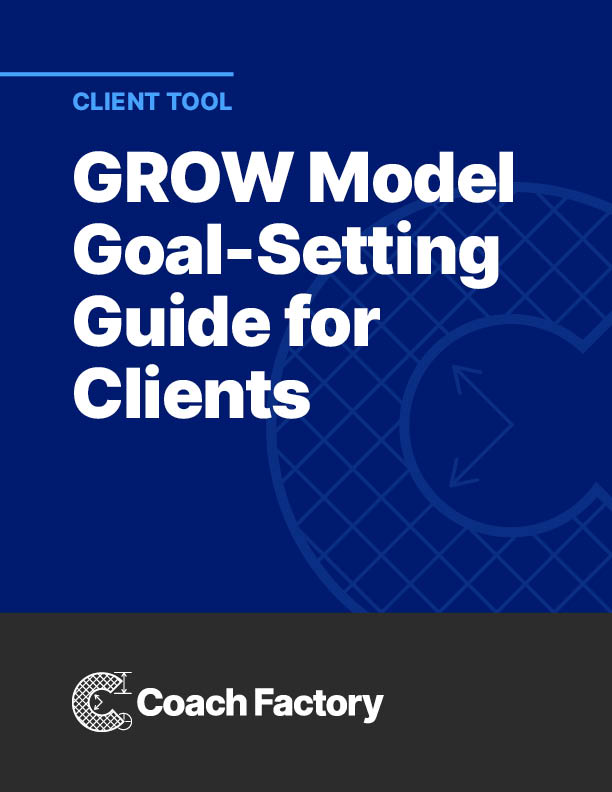On this page, you’ll find a curated collection of our most helpful resources for coaches looking to enhance their coaching skills, from helpful blog posts to practical tools, inspiring podcasts, and exclusive VIP articles to help you level up your coaching practice!

Top Blog Posts for Enhancing Your Coaching Skills
Start right here with the top blog posts for coaches looking to enhance and hone their coaching skills, with insights and practical advice to elevate your coaching practice and create greater impact for your clients.

The 3 Most Effective Executive Coaching Models for Boosting Leadership
Learn how to use the Golden Circle, the GROW model, and the OSKAR model — three excellent frameworks for executive coaching.

How to Use Executive Career Coaching for Clients’ Dream Jobs
Executive career coaches work with professionals to help them navigate and find success in their career using business knowledge, coaching strategies, and tools.

Executive Presence Coaching: Helping Clients Communicate and Present with Authority
Executive presence coaching improves speech, charisma, confidence, and appearance to drive effective leadership. Learn more about the executive presence sub niche.

Free Health Coach Session Template with 50 Questions to Ask Clients
Want more consistency in your health coaching sessions? Download this free Health Coaching Session Template to structure your sessions for client success!

How to Leverage High Performance Coaching for Your Clients
Learn how to use high performance coaching so your clients can maximize their potential and achieve exceptional results.

Help Your Clients Overcome the Odds of Failure with Leadership Coaching
Transform your clients with leadership coaching. Learn the eight primary styles of leadership types and three powerful leadership coaching exercises.

Using Business Coaching Assessments to Give Your Clients the Results They Crave
Discover the best business coaching assessments to help clients set goals, identify motivations, communicate more effectively, and lead with excellence.

Coaching Teams in the Workplace: Inspiring Groups to New Heights
Team coaching in the workplace is a collaborative and empowering approach that builds stronger businesses. Learn how to use business team coaching in your practice.

Business Coaching Goals: Helping Clients Set and Reach Impactful Goals
Need new frameworks to help your business coaching clients set better business goals? Download a goal setting worksheet for business coaching clients here.

The 7 Best Business Coaching Books to Empower Your Practice
Explore the top business coaching books to bridge the gap between where you are and where you want to be as a business coach. Learn how to better serve clients.

How to Use the Wheel of Life as a Life Coaching Exercise [+Free Worksheet]
Learn how to use this free Wheel of Life worksheet in your coaching practice. The printable template includes top questions to use with your clients

The 15 Most Powerful Coaching Skills Your Clients Need You to Have
Transform your coaching practice with these 15 skills to make more meaningful and impactful contributions in helping your client reach ultimate success.

Use the GROW Model for Coaching Your Clients to Clarity +Free Printable Worksheet
Help your coaching clients find the clarity they need to reach their goals with the GROW Model.

6 Life Coaching Tools and Models to Unlock Your Clients’ Potential
Learn how the GROW model, the Life EKG, the CLEAR model, and three more powerful coaching tools can make a huge difference in your practice.

What Are the 5 Coaching Styles? And Which Are Best for Your Practice?
Explore the 5 key coaching styles — democratic, authoritarian, holistic, autocratic, and visionary — to optimize your coaching practice.

How to Use a Coaching Feedback Form to Become a Better Coach + Examples and Templates
Coaching feedback forms are an avenue for clients to explain how they perceive your services. Use these free coaching feedback templates to improve your practice.

Popular Coaching Assessment Tools for All Kinds of Coaches: Life, Health, Business, and More
Learn more about the most popular and effective coaching assessments tools for coaches in career, health, business, executive, life, and leadership niches.

How the Therapeutic Relationship Fosters Trust and Connection Between Coach and Client
Learn the difference between coaching and therapy while exploring how therapeutic relationships can help your coaching practice.

How to Use Confidence Coaching to Empower Your Clients
Confidence coaching is more than a method. It’s a transformative journey that can profoundly impact your clients’ lives.

How to Use Assessments With Your Coaching Clients to Set and Achieve Goals
Maximize coaching success with assessments! Learn how to use goal-setting tools and measure progress to increase client engagement and growth.
Podcast Episodes to Level Up Your Coaching Skills
Handpicked episodes from the Coach Factory podcast, your ‘backstage pass’ to real-world insights from veteran coaches who’ve been right where you are, tailored to help you improve and enhance your coaching skills.
Downloadable resources, worksheets, templates and tools to enhance your coaching skills and practice.
VIP Articles for Enhancing Your Coaching Skills
Exclusive articles written by experienced coaches just for Coach Factory members, offering practical advice and personal insights to help you enhance and hone your coaching skills.
What to Do When Coaching Clients Don’t Listen
Practical tips and strategies for handling tricky coaching clients who ignore your advice and recommendations.
Read the Article

























